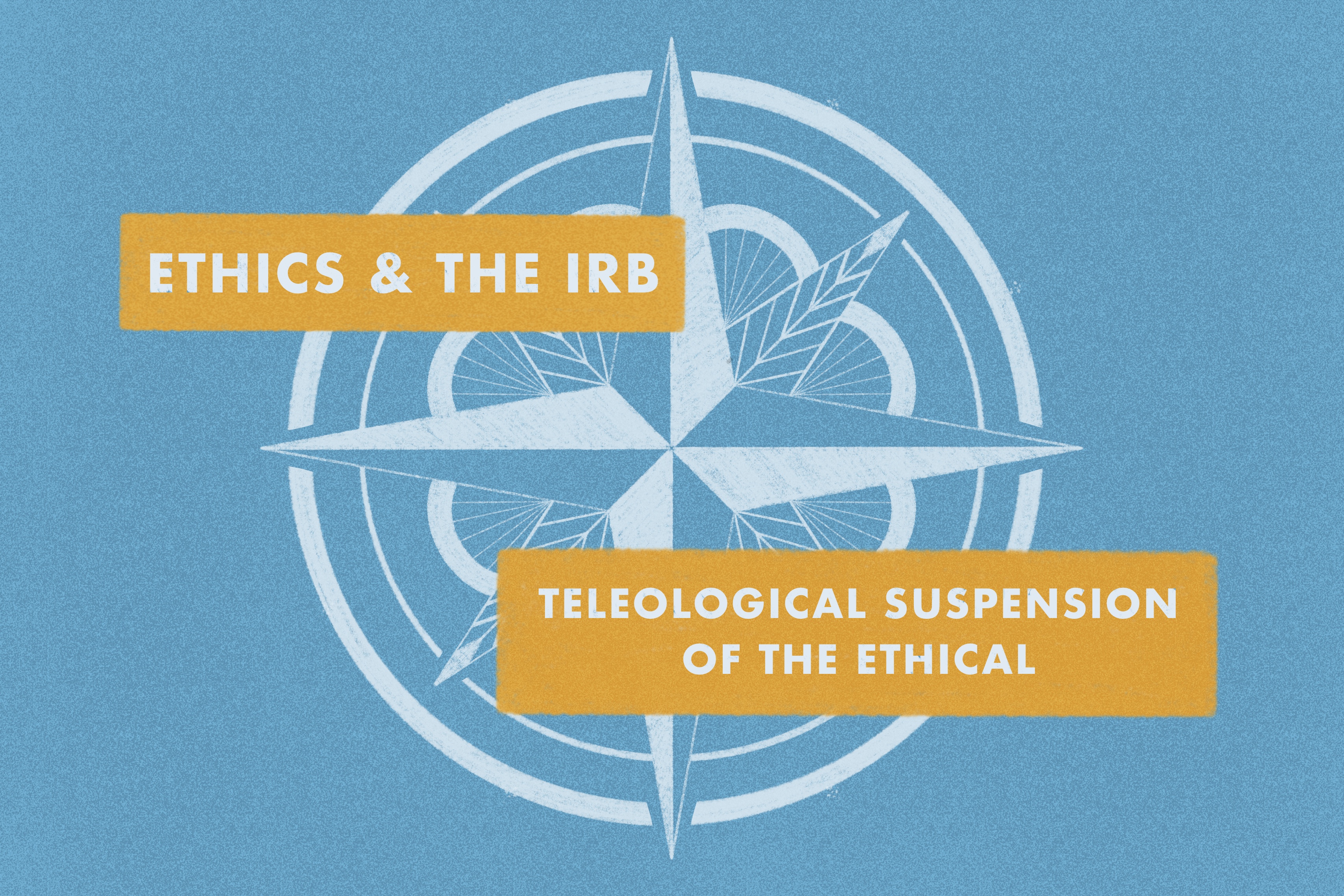Fear and Trembling: Understanding the Role of the Telos
In our second post of the Ethics and the IRB series about Categorical Imperatives, we examined the application of categorical imperatives, as conceived by Immanuel Kant, in research ethics. Kant defined categorical imperatives as universal moral imperatives that are binding on all individuals.
A generation after Kant, Soren Kierkegaard responded to the evolving idea of categorical imperatives in his book, Fear and Trembling. In it, he described the concept of telos as an individual’s purpose in life. Kierkegaard indicated that an individual’s ethical telos was to overrule one’s particularity (unethical wants and desires) in order to reconcile oneself with the universal (or that which is ethically sound). One moves towards their telos (ultimate aim) by taking actions (committed choice to a process), that are in line with the universal. In this case, the universal is similar to Kant’s categorical imperatives; Kierkegaard posited that the universal are rules that apply to all moral agents. For an in-depth look at the meaning of actions, check out our post on Aristotle & Consent as a Process.
Teleological Suspension of the Ethical
Unlike Kant however, Kierkegaard wrote about instances when it may be justifiable to act out of accordance with the universal. In Fear and Trembling, Kierkegaard discussed the biblical example of Abraham and Isaac in order to justify times when it may be acceptable to break societal ethics (e.g., universal). Looking at the paradox of faith, Kierkegaard concludes that there must be times where we cannot provide an ethical justification of action according to normative ethics, yet if the action fulfills one’s telos or higher purpose (in Kierkegaard’s example, Abraham’s telos was ultimate obedience to God over moral regard for life), they have transcended or suspended, not violated, the universal. Under these circumstances, fulfilling one's purpose (telos) justifies actions that contradict societal ethics. However, knowing when this situation may apply to one’s ethical dilemma is not always clear, especially during the decision-making process.
Examining how Kierkegaard built his ideas off of Kant and other philosophers gives modern ethicists and regulatory specialists insight into how ethical thought has evolved over time. These accounts can reveal what individuals value and what ethical standards persist across generations. They also provide a lens through which we can examine current ethical guidance in today’s world of research.
Research Ethics Today
Modern researchers have an ethical responsibility to uphold federal, state, city, and institutional ethical codes in all aspects of their research. When researchers engage with participants in human subjects research, they have a duty to adhere to the ethical principles of:
- Beneficence (do no harm),
- Justice, and
- Respect for persons.
In practice, upholding ethical principles in research requires that researchers inform participants of the study risks prior to obtaining consent, appropriately compensate participants in a timely manner, and protect their data from disclosure to the general public.
Researchers also balance their duty to follow through with their commitments to participants, especially when direct benefits are involved. This may include timely delivery of monetary compensation at the end of a study, administering a medical trial, or completing a service for the participant (e.g., neuropsychological screening or diagnosis, implementation of educational materials, provision of technologies, etc.). Oftentimes, the scope of participant protections depends on the type of research being conducted, the population of interest, and the risk involved with a study.
Ethics and Catastrophic Events
Given the wide scope of research ethics, there are times when two ethical duties conflict with one another. These cases can lead to a teleological suspension of the ethical. For example, in March 2020 with the initial outbreak of COVID-19 in the United States, numerous in-person studies were suspended in order to contain the spread of the novel virus. Some of these suspended studies included the delivery of medical treatments, therapeutic interventions for clinical disorders, and in-community services and compensation for marginalized and low-income communities. In many of these cases, the study populations were high-risk or vulnerable (requiring more stringent protections). Review boards, ethicists, and researchers weighed the consequences of study suspensions against the risk of continuing in the face of an unprecedented pandemic. Looking at it through the lens of Kierkegaard, the researchers’ telos (beneficence) was in conflict with the universal (standard ethics practice to follow through with commitments and promised services), resulting in a teleological suspension of standard practice.
With the rapid spread of COVID-19 and the limited scope of knowledge around how the virus was transmitted, TC researchers with the support of TC IRB, made the difficult decision to suspend all in-person studies prior to the New York state executive order to shelter in place. At the time, ethicists grappled with serious concerns regarding long-term in-person suspension and the potential of causing undue harm to participants because of that suspension. In this unique case, the health and well-being of participants took precedence over the fulfillment of commitments to participants. This decision to prefer COVID-19 prevention over service delivery was also upheld by the New York state’s mandated shelter in place and guidelines for research released by the Center for Disease Control.
The decision to pause all in-person research required thoughtful decision-making and careful consideration for all invested parties. The core principle of beneficence—do no harm—guided every step of the decision-making process. In their choice to suspend research, TC IRB and researchers sought to maximize benefits for participants and minimize risks This commitment to ethical principles is the foundation of the IRB and will continue to guide each action the IRB takes to ensure the protection of participants’ rights in human subjects research.
